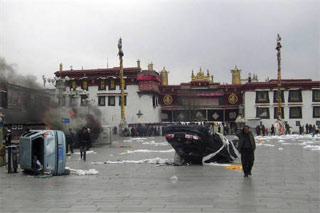
The protests against Chinese occupation in Lhasa have turned violent, with an increased use of force by Chinese troops and police.
Image (Reuters): overturned cars and burnt-out shops in Barkhor Square, the large open-air market area in front of Jokhang temple, in the "Tibetan Quarter" of Lhasa, Tibet, earlier today.
– – – – – – – – – – – – – – –
It's hard to explain how surreal and sad the photo above seems. When I traveled in Tibet to produce a radio series for NPR, I stood in that very spot for hours, recording the ambient sounds of Tibetan people worshipping at the door of Jokhang temple, chanting "om mene pedme om," and stretching their bodies out on the ground in a gesture of humility and faithful submission to the gods. Others stuffed barley flour and cedar branches into large incense burners nearby; those burnt offerings that were the only smoke I'd ever seen in this place.
The reports of violent force being used against monks and nuns in Lhasa temples are so hard to read. I am not a Buddhist, or Tibetan, and that culture is not my own. But the brief time I spent in and around those monasteries and nunneries affected me profoundly, permanently. The overwhelming sense of history, of accumulated prayers, of sustained and concentrated peaceful thought — when I think of soldiers attacking worshippers in this place it's just so deeply incongruous, deeply sad.
Witnesses say the protesters burned shops, cars, military vehicles and at least one tourist bus. (…) A local travel agent, reached by telephone, said a riot broke out at the market and around the nearby Ramoche Temple because of friction between Tibetan and Han Chinese traders. The agent said fires erupted near the Ramoche Temple and elsewhere in the market area, while Tibetan traders also overturned a tour bus and set it ablaze.
"There was a fight between the bus owner and the Tibetans who set the fire," said the agent, who is Han Chinese. "But not serious. Only several people got hurt."
The demonstrations apparently expanded as protesters set fire to other shops. Western news agencies reported that monks from the Ramoche Temple went into the streets and clashed with police officers. "The monks are still protesting," one witness told the Associated Press. "Police and army cars were burned. There are people crying. Hundreds of people, including monks and civilians are in the protests."
His Holiness the Dalai Lama released a statement online:
As I have always said, unity and stability under brute force is at best a temporary solution. It is unrealistic to expect unity and stability under such a rule and would therefore not be conducive to finding a peaceful and lasting solution.
I therefore appeal to the Chinese leadership to stop using force and address the long-simmering resentment of the Tibetan people through dialogue with the Tibetan people. I also urge my fellow Tibetans not to resort to violence.
Some travelers on Lonely Planet's Thorn Tree Forum for Tibet are posting first-hand testimony:
the situation seems to be very nervous and paranoid up here. there is police and military everwhere. suddenly you would see some policemen running and rushig somewhere…
at night it's quite strange to see hundrets of policeforce watching you from every corner.
Reuters account here, and this BBC report includes a tourist's eyewitness testimony of ethnic Tibetan monks being beaten by Chinese authorities at Sera Monastery (a popular place for tourists to visit, encouraged as a sort of entertainment destination by travel firms — when I was in Tibet, I heard some people refer to it as a "monk zoo"):
[W]e saw the police – two or three who were inside the compound – suddenly speaking into their radios. They started going after the monks, and plain-clothes police – I don't know this for sure but that's what I think they were – started to emerged from nowhere.
There were four or five in uniform but another 10 or 15 in regular clothing. They were grabbing monks, kicking and beating them.
One monk was kicked in the stomach right in front of us and then beaten on the ground.The monks were not attacking the soldiers, there was no melee. They were heading out in a stream, it was a very clear path, and the police were attacking them at the sides. It was gratuitous violence. The Tibetan lay-people started rushing to get out of the temple. Tibetan grandmothers were grabbing young kids and getting them out.
Previously on BB:





